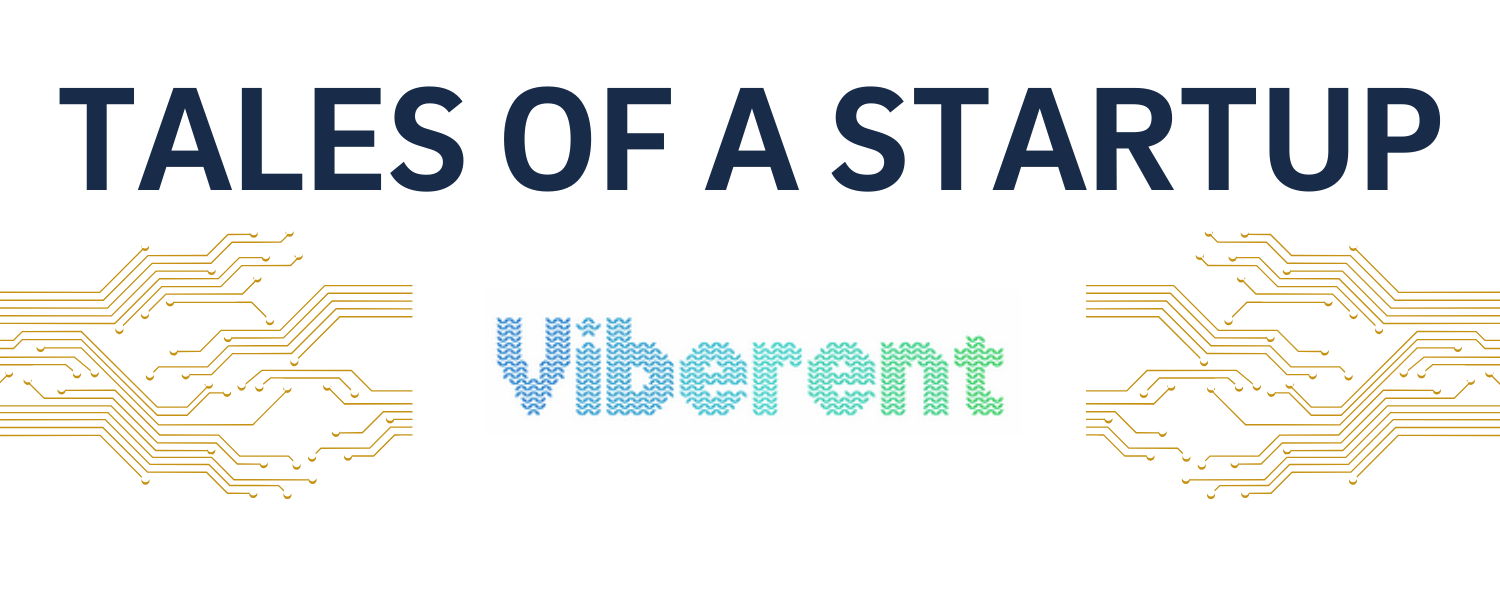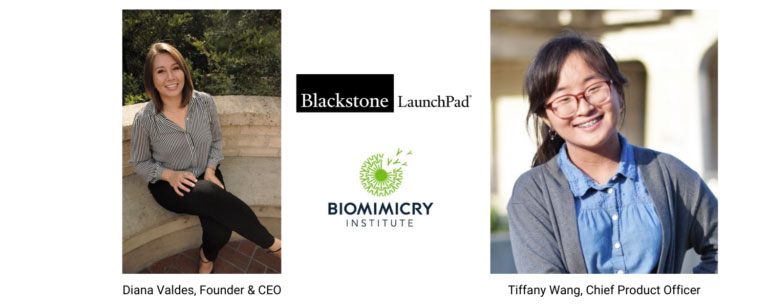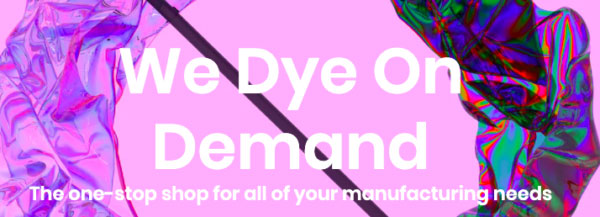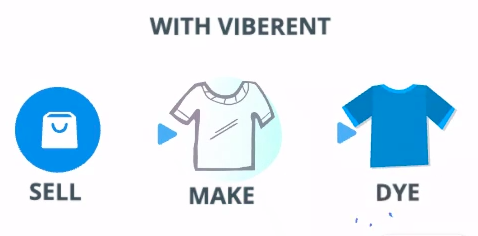 Basement Co-Founders Share their Journey to Entrepreneurship, Coloring the World of Fashion
Basement Co-Founders Share their Journey to Entrepreneurship, Coloring the World of Fashion
March 29, 2021
We're changing the game, we are dyeing clothes on-demand
Viberent brings forward the need to transform the wasteful linear model of the fashion industry into a closed loop model. Founder and CEO, Diana Valdes, grew up in a small town in Mexico where the only source of income was working at jean manufacturing sweatshops (maquiladoras).
Experiencing first hand the complexity of the industry; the environmental pollution, the continuous exacerbation of poverty in developing countries, she teamed up with Tiffany Wang, Viberent’s Co-Founder and Chief Product Officer, who shared a passion for developing sustainable closed loop processes that would leverage her chemical engineering background.
Read more on their #FemaleFounder journey through The Basement’s BlackstoneLaunchPad program.

What excites you about your work?
DV: Everyday is customer discovery, you never know what you are going to find! It’s the excitement that comes with not knowing what’s going to happen. It’s a rollercoaster. I love collaborating with other students, as well as industry who are excited and believe in what we are doing. We have created a community that holds us accountable.
I’ve always wanted that sense of community. I’ve always been trying to find my place. Entrepreneurship is where I belong. The possibility of pioneering a new market and technology is incredibly exciting. Growing up in Mexico, my mom worked in a sweatshop. This story is not typical for someone with my background. It makes me believe and can show others it is possible.
"I've always wanted that sense of community. I've always been trying to find my place. Entrepreneurship is where I belong."
- Diana Valdes, Founder/CEP
TW: I get to wear a lot of different hats throughout the day, from conducting customer discovery interviews to getting feedback on our prototypes from different brand designers. We are always bouncing ideas off our interns, mentors, and advisors. I’m currently learning how to piece together a possible supply chain by speaking with different manufacturers.
How did you first get involved with The Basement & the UC San Diego entrepreneurial community?
DV: One of the reasons I came to UC San Diego was because of The Basement. I had this crazy idea three years before I started working on it. My goal was to go to a university that fosters a sense of entrepreneurship. I immediately knew I wanted to work on my idea at The Basement.
On Orientation Day at Muir College, The Basement was tabling and the rest is history!
TW: I remember talking about starting my own company freshman year. I met Diana at UC San Diego’s Ignite Conference back in 2019 during my junior year. She was tabling for her crazy idea of color-changing clothes. I wasn’t fully onboard at first (she had to hunt me down a couple of times) until she invited me to participate in the NSF Innovation Corps together a month later.
Having to put myself out there by setting up customer interviews and presenting our findings to mentors sparked my interest in entrepreneurship. I couldn’t get enough of that sense of discovery so I joined the Converge Summer Incubator in the Basement. Spending eight weeks refining our problem statement and possible solution set us up to apply for all sorts of undergraduate funding opportunities my senior year.

What campus resources have helped you throughout your student entrepreneurial journey?
DV: We are currently in the Biomimicry Design Challenge, sponsored by The Basement. During undergraduate, I took classes at Rady School of Management, including a fantastic class on corporate social responsibility, which touched on biomimicry. I want to create clothes that change colors to reduce waste. I thought how innovative, learning from nature and mimicking what it does (bridging the gap between engineering and science).
We also applied to the UC Big Ideas contest, which was another great funding source for us. It was a six month process. We wanted someone in the sustainable textile industry. It gave us access to so many people willing to help us on our journey.
TW: The NSF Innovation Corps was an amazing resource. It was the first thing Diana and I did. It really sealed my interest with their intense customer discovery bootcamp. We also went through Rady's StartR Inclusion Accelerator, through which we were able to file for a provisional patent. They took the time to listen and help us with our ideas.
"The NSF Innovation Corps was an amazing resource. It was the first thing Diana and I did together. It really sealed our interest with their intense customer discovery bootcamp."
- Tiffany Wang, Viberent's Co-Founder & Chief Product Officer
How do you balance being a full-time student while also running a startup?
DV: Sociology trains you how to think about the world. I apply that to everything I do, constantly exercising that muscle. I took businesses classes that were relevant to what we were working on. The first part of the adventure was about learning from others. Once I graduated, I put those lessons into practice.
TW: I always asked - what can I learn today in class that I can apply to my startup? During my senior year, we were trying to validate the problem. I was working on acquiring non-dilutive funding opportunities for undergraduates (such as Venture Well and the Big Ideas Contest). That was one of the many advantages to starting your business in college. It definitely helped me be more invested in classes. As a student, it is also much easier to reach out to industry professionals to set up customer discovery interviews and get free access to market research reports through our library’s catalog.
What role have mentors played in your success/journey?
 DV: We came into this space not knowing what we were doing. Mentors helped us pave the path to follow - helping us apply to competitions, grants, and offering fantastic points of connection. Eamen Hameed helps us see further, keeping our spirits up and making sure we have fun. We were partnered with him at NSF I Corps. He taught us business etiquette and how to make a good impression!
DV: We came into this space not knowing what we were doing. Mentors helped us pave the path to follow - helping us apply to competitions, grants, and offering fantastic points of connection. Eamen Hameed helps us see further, keeping our spirits up and making sure we have fun. We were partnered with him at NSF I Corps. He taught us business etiquette and how to make a good impression!
Jacques Chirazi, Director of UC San Diego's Blackstone LaunchPad, has been so helpful in every way. He has been a great supporter. He will email us competitions to apply to or nominate us - he is always thinking about opportunities for us. These two mentors really paved the way.
George Eiskamp and Kim Davis King have been incredible sponsors for women-owned startups. They both have taught us invaluable knowledge on how to navigate the startup world, especially as a first generation student like myself.
TW: For tech development, Ray Freiwirth was immensely helpful in teaching us how to write provisional patents. We found him through The Basement and signed up for his office hours. He was also building his own startup so it was great to have another founder to talk to. Whenever we encounter technical challenges during prototyping, it is really reassuring to meet up with Professor John Newsam to brainstorm different approaches.
Gloria Negrete and Christine Liou over at the Basement encouraged us to apply for the VentureWell E-Team program (third time really was the charm!) and introduced us to more opportunities through the Basement’s entrepreneurial programs. These mentors really paved the way.
What advice would you give to another UC San Diego student thinking about starting a company?
DV: Make sure you are always having fun - this should be fun. When you aren’t having fun, it’s not worth your time or energy. Make sure you do the research. Don’t incorporate until you are ready. Legal fees are pricey.
"Make sure you are always having fun - this should be fun. Whwn you aren't having fun, it's not worth your time or energy."'
- Diana Valdes
You have to show up and do the work. You have to earn it, do the work. It’s all very humbling, it’s not something that is just handed to you. You have to earn your own way.
TW: Really take the time to understand the equipment and manufacturing services that are already available. Building everything from scratch isn't the answer if you can find suppliers! You don’t have to have an idea to get started! Fall in love with the problem you are trying to solve and the idea will come. After all, it’s hard to find ideas and much easier to find problems.
While you do need to submit an idea to get into entrepreneurship programs, ironically once you are in, they teach you to test your idea by getting out of the building and talking to customers to pinpoint the hair-on-fire problem. Your idea will evolve alongside you as you persist and make pivots on your entrepreneurial journey.
To learn more about closing the loop, visit http://www.viberent.co or contact the team at info@viberent.co